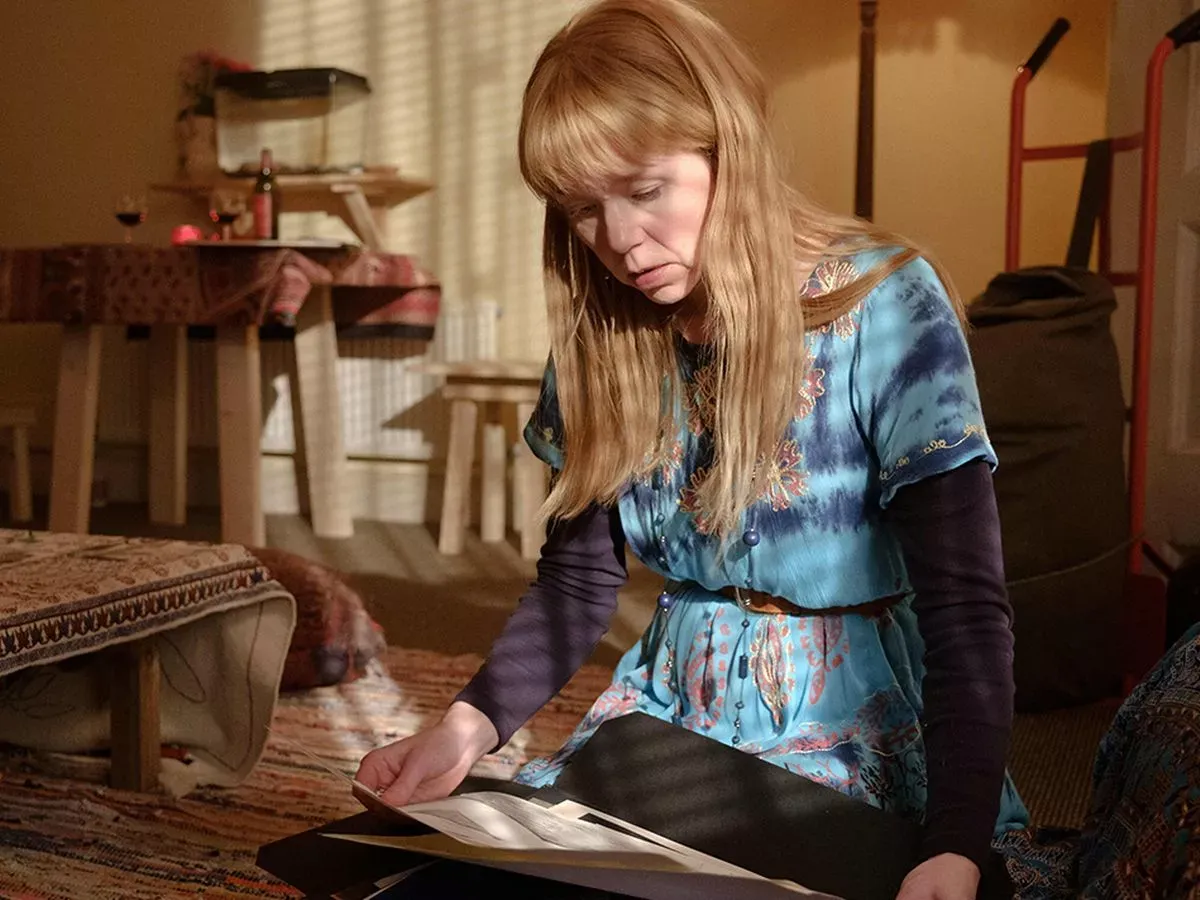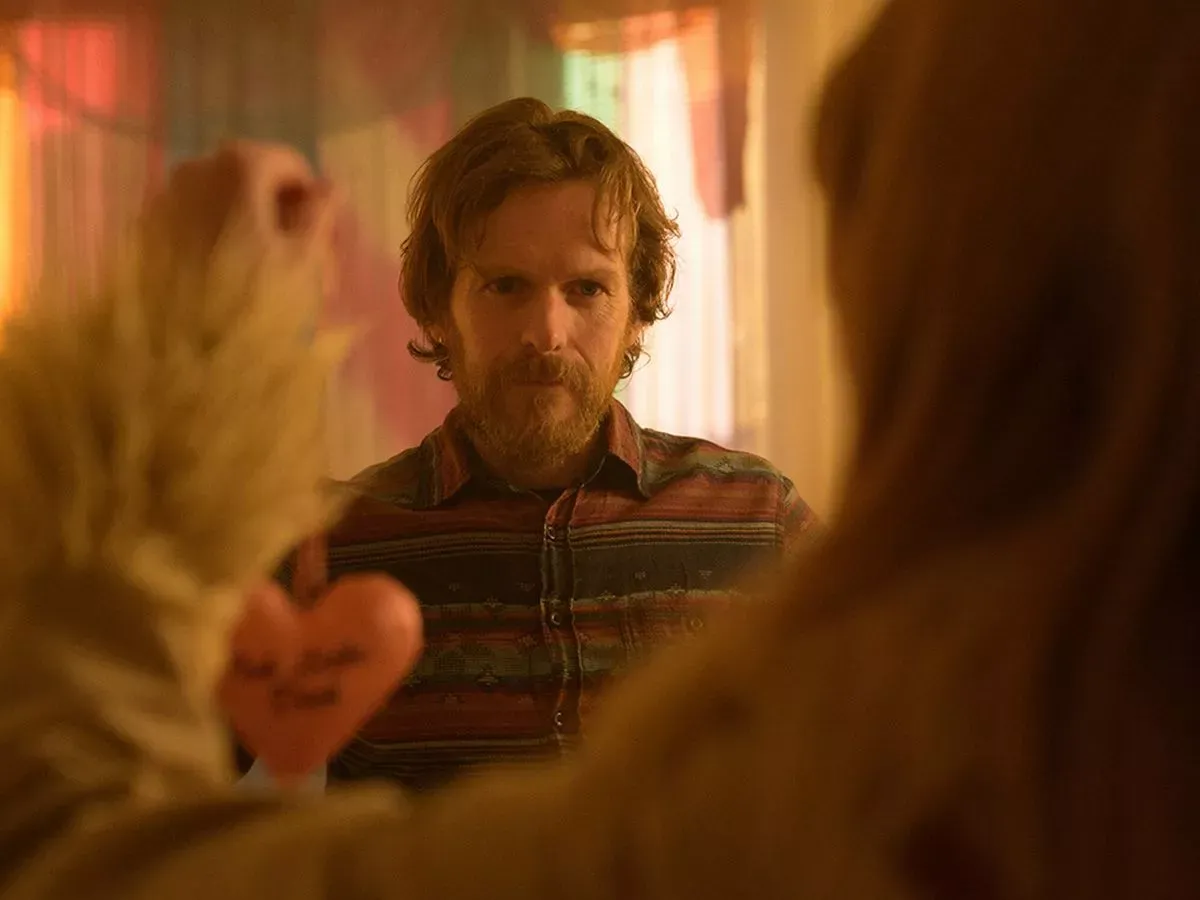As the title suggests, Until I Kill You delves into dark themes of domestic violence and its enduring effects. This four-part drama series aired on British network ITV earlier this year, adapting the harrowing autobiography by Delia Balmer. She recounted surviving years of assaults by her boyfriend, John Sweeney, who was later revealed to be a serial killer.
Through flashbacks and a nonlinear narrative, we learn of Delia’s initial meeting with Sweeney at a pub and the horrors that followed. Played with intensity by Anna Maxwell Martin, Delia is no simple victim—she’s a complex, stubborn loner. This makes her all the more believable as a survivor fighting for justice, even as the system fails her. Shaun Evans is disturbingly convincing as Sweeney, charming yet increasingly monstrous.
The story spans decades as Delia struggles with trauma’s lasting shadows. We see how abuse imprints on both mind and body, as the legal process brings fresh pain. Directors effort to understand, not judge, creating empathy without exploitation. These sensitively handled themes give context for the violence, examining society’s role in enabling abuse through apathy.
Both script and performances avoid easy answers. Through nuanced portrayals of pain and perseverance, Until I Kill You offers compelling drama and food for thought on darkness that infects societies and strength of spirit that overcomes. For those willing to engage with difficult realities, this series delivers an impactful tale of truth and triumph over evil’s banal face.
Delia’s Devastating Story
We first meet Delia Balmer at a pub, where she encounters carpenter John Sweeney. An independent spirit who keeps to herself, Delia is drawn to John’s charm and rugged nature. The drama wastes little time before darkness falls.
Quickly John turns abusive, beating and raping Delia savagely. Their relationship plunges into a nightmarish cycle of trauma. John takes twisted pleasure dominating Delia’s passionate will, keeping her hostage with threats of more harm.
Eventually it emerges John has been a serial killer all along. He strangles an ex in front of Delia, confessing to prior murders. Yet even arrest offers no escape—police bungle evidence while John toys with Delia from jail.
Nonlinear flashes reveal the depth of John’s depravity. We see him dumping bodies, while Delia struggles for normalcy against intrusive memories. Her trauma transforms into volatile anger few understand.
Years pass as John evades conviction, taunting Delia still. The legal system treating her ordeal as an afterthought reopens wounds. Justice proves painfully elusive as police flounder.
Through it all, Delia endures with fierce tenacity. Her story highlights abuse survivors’ resilience against darkness that refuses to relinquish hold on their lives. Though freed from John, inner demons linger as the fight to find peace wages on.
In intimate glimpses of a shattered existence pieced back together, the drama unpacks devastation’s enduring impacts with haunting authenticity. Delia’s victory emerges not from capturing monsters but from living on despite all they left in ruins.
Brilliant Performances Breathe Life into Devastating Drama
From her first scenes, Anna Maxwell Martin commands attention as the complex Delia Balmer. Bringing fierce defiance mixed with hidden vulnerabilities, Martin ensures viewers feel her inner conflict without simplifying trauma into base emotions.
Subtly, she layers defensiveness over grief, bitterness shielding pain. Her Delia rejects pity while demanding understanding, stubborn pride warring with inner turmoil. Despite edges as sharp as broken glass, Martin’s nuanced work lays bare a spirit slowly being worn down yet never broken.
Across trauma’s changing tides, her ability to toggle between raw anger and weariness of soul gives each shift credible grounds in personal truth. Directors keen to provide trigger warnings would do well learning from her fearlessness blurring make-believe and reality with compassionate craft.
Opposite Sweeney, Shaun Evans excels at casting charming smiles over monstrous darkness. Startling fans used to his Morse, Evans smoothly slips between personae—affable woodworker by day, haunted psychopath by night.
Beneath façades lurk bottomless voids no light may touch, yet once indelibly seen, impossible to unseen. With leviathan menace coiled patient cat-like, Evans ensures Sweeney dominates even when off-screen, toxic fingerprints terrorizing victims long after fleeing physical thrall.
Strongest support comes from Kevin Doyle’s David, a lifelong rock for the shattered Delia. Portraying a real man’s gentle dedication with shrewd grace, Doyle affords suffering souls a rare safe harbor in life’s storms.
Through powerhouse performances, Until I Kill You drags the darkest deeds into piercing light, demanding audiences feel what they see and recognize humanity in all its forms. These artists deserve the highest praise for courageous mastery over such difficult material.
Delia: A Survivor Unlike Any Other
From the first moments, Delia Balmer distinguishes herself from typical victims we’ve seen before. Independent and aloof where others seek company, awkwardness shields fierce pride refusing compromise.
Her self-reliance strengthening over years alone makes her fight all the more credible. Relentless defiance wears down, yet spirit never breaks—resilience born from necessity, not traits TV dramas often grant.
Trauma-changing one is a truism, but rarely depicted how—the mounting anger, growing hardness, survival demands as wounds reopen endlessly. Her trauma transforms, yet woman remains, survival its own statement of triumph though darkness lingers close.
Through Delia, viewers witness abuse’s impact beyond initial pain. We understand how defiance, once shielded, becomes double-edged over time—protecting yet distancing people from the healing connections Delia most desperately wishes to find.
Her reactions feel real, not sensationalized—emotions as messy as life itself, not neatly categorized as scripts often ask. In her, survivors find themselves reflected with raw honesty few dare show.
An uncompromising, complex portrayal this is—and by embracing life’s messy shades of gray, the story resonates with authentic heart many find missing from such tales. Delia educates as she moves us—her scars, hard-won victories, will endure with audiences long after credits roll.
Hidden Wounds and Harsh Realities
No good comes from bungling, yet again we see how police failures reopen scars for abuse survivors. Delia’s harrowing story underscores such truths, from loose lips escalating threats to legal wrangles protracting agony.
Through no fault of her own,Delia bears fresh assaults courtesy of the very system vowing protection. Her bitterness holds Mirror to systemic negligence keeping predators in hunting grounds. Abuse thrives where indifference and slack handling of cases let brutality fester unchecked.
Past horrors’ long shadow also lurks in everyday struggles many viewers likely never witness. We see how trauma imprints upon mind and identity, scarring self-perceptions permanently. flashbacks and difficulties connecting hint at burdens silently shoulderered.
As for monsters, the drama shuns labeling in favor of probing dark urges’ wellsprings. Sweeney personifies a twisted pursuit of control springing from inner voids, yet his depiction holds neither pity nor sensationalism—only a refusal to turn away.
Throughout, the story conveys its troubling substance through intimately drawn lives, not lurid displays. Viewers glimpse devastation and endurance, then exit viewing abuse and victims in a newly thoughtful light. In gravitas and grace, Until I Kill You lifts a curtain few dare open.
A Visual and Audio Odyssey into Darkness
Director Julia Ford guides viewers into darkness with deft grace, never flinching from horrors yet respecting fragility in humanity’s remains. Across grim scenes, she maintains focus on persevering spirit above all else, ensuring trauma conveys its lessons without lingering exploitation.
Ford leads cameras through haunting locales with attentive vision. Cruelty finds no refuge from her observant lenses, yet suffering souls find empathy and shelter in shots capturing resilience’s beauty against all odds. With keen sensitivity, she frames turmoil in a manner compelling soul-searching without sensationalism.
Meanwhile, unforgettably eerie scores fill sparse silences where words fall short. Each note drips tension while honoring pain’s many voices through various tones. Gentler themes drift amongst the dissonance, affording moments to breathe before immersing deeper into thrumming dread.
Sound designers tighten coils of anxiety at perfect beats. From subtle strains of strangeness to blunt assaults, audio artists render even safe scenes briefly unnerving. Their craft ensures the drama’s horrors resonate past sight alone, burrowing grasp on imagination’s recesses.
In Ford’s adept audio-visual odyssey, any glimpse into darkness proves enlightening. Through her visionary guidance, Until I Kill You delivers devastating impact that lingers long after ending, demanding reflection on shadows society insists on forgetting.
A Haunting Story of survival’s Strength
In depicts a harrowing true account with understated grace, Until I Kill You will linger long after closing credits. Directing unflinching gazes towards the darkness society prefers forgetting, this series treats difficult themes with empathy devoid of easy answers or peddled pity.
Layers of nuanced performances and carefully crafted scenes resonate with quiet power. By prioritizing survivors’ resilience over predators’ notoriety, the drama highlights humanity’s capacity to endure where all seems lost. Though confrontational, its message brings hope that light may emerge from even life’s deepest shadows.
Not for the faint of heart, this material brings serious issues into piercing focus through intimate glimpses of shattered lives gradually rebuilding. While certainly not light viewing, the program rewards mature eyes willing to bear witness to truth and contemplate darkness’ role in society.
In refusing reassurance, the story provides no comfort yet celebrates the strength of spirit that rises above all efforts aiming to destroy it. Ultimately a testament to triumph against daily evils wearing banal faces, Until I Kill You delivers a profound, haunting meditation on survival that will linger long after its final frame.
The Review
Until I Kill You
Until I Kill You has proven a complex yet impactful dissection of trauma's enduring impacts and one survivor's unfathomable strength of spirit in its face. Maintaining focus on real human perseverance above sensationalism, the series treats difficult issues with empathetic nuance through committed performances and sensitive direction. While unflinching in its gazes into darkness places most wish not to see, the program ultimately brings a message of hope through illuminating one woman's indomitable drive to stitch meaning from a life almost destroyed.
PROS
- Complex portrayal of trauma that feels authentic
- Committed performances that bring characters to life
- Sympathetic treatment of difficult themes with empathy
- Subtle direction and production values that enhance the tone
- Gripping true crime narrative that maintains attention
- Provides perspective on abuse impacts and survivors' struggles
- An inspiring message about human perseverance in the face of darkness
CONS
- The heavier subject matter may be difficult for some to watch.
- Can feel slow-paced at times in its character developments.
- Occasional tonal shifts between dramatic scenes





















































